Maine Coon Cat is one of the most unique and beloved breeds in the world. Known as “gentle giants,” these cats impress with their large size, tufted ears, and bushy tails. Their water-repellent coats and striking features make them stand out among other cat breeds.
Beyond their appearance, Maine Coons have big personalities. They are friendly, playful, and highly intelligent. These traits make them perfect companions for families, singles, and even other pets. Whether they’re chasing toys or curling up by the fireplace, Maine Coons know how to win hearts.
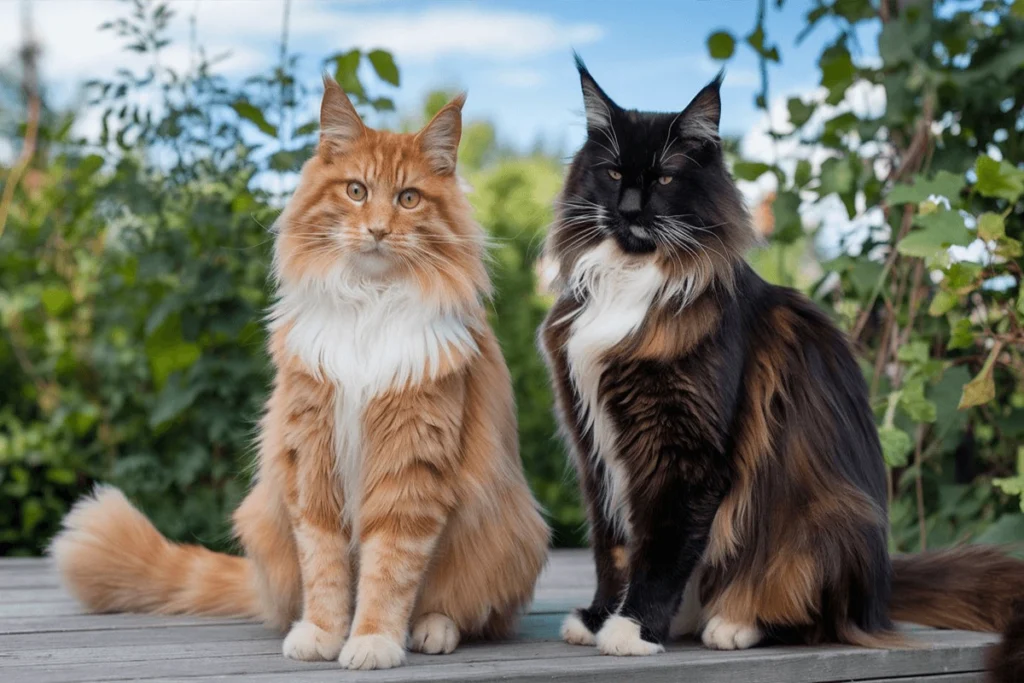
The breed’s origins are surrounded by fascinating stories. Legends suggest they traveled with Vikings or descended from wild raccoons. While the truth remains a mystery, their history adds to their charm. Combined with their hunting skills and trainability, Maine Coons are truly extraordinary.
In this post, we’ll explore 10 fascinating facts about Maine Coons. Whether you’re a cat lover or considering adopting one, this guide will deepen your appreciation for these majestic felines. Let’s dive in!
The Origins of Maine Coon Cat
Maine Coon Myths and Legends
The origins of the Maine Coon cat are steeped in fascinating folklore and whimsical stories. One popular myth claims that Maine Coons are the result of a crossbreeding between domestic cats and raccoons. While biologically impossible, this idea arose because of the Maine Coon’s bushy tail and tabby-like markings, which resemble a raccoon’s.
Another captivating tale links Maine Coons to seafaring Vikings. Some believe that the breed descended from long-haired cats brought to North America by Viking explorers like Leif Erikson. These hardy cats were thought to have adapted to the cold New England climate, developing their thick, water-resistant coats over time.
There’s also a royal twist to their supposed history. Some stories suggest that Maine Coons are descendants of the long-haired cats brought to Maine by Marie Antoinette’s servants. Fleeing France during the Revolution, the servants supposedly transported the queen’s beloved cats to safety in the United States, where they interbred with local cats to create the Maine Coon Cat.
While none of these legends have been proven, they add to the breed’s mystique and charm, making Maine Coons even more intriguing.
Official Recognition
Maine Coons may be a well-loved breed today, but their journey to recognition wasn’t immediate. They were first documented in the 1800s as working cats on farms in New England. Their impressive hunting abilities and large size made them invaluable to farmers needing to control rodent populations.
The breed’s popularity grew when they were showcased at early cat shows in the late 19th century. A Maine Coon named “Cosey” even won a silver collar at one of the first U.S. cat shows in 1895. This event marked the beginning of their rise in the cat world.
However, their fame waned in the early 20th century when exotic breeds like Persians and Siamese became more popular. It wasn’t until the 1950s and 1960s that dedicated breeders revived interest in the Maine Coon. The breed finally gained official recognition from cat associations like the Cat Fanciers’ Association (CFA) in 1976. Today, Maine Coons are one of the most popular and beloved breeds globally.
Unique Historical Role
Maine Coons have played an essential role in the history of New England. Originally working cats, they earned their keep on farms and ships as skilled hunters. Their large size and sharp hunting instincts made them excellent at catching rodents, a vital task in rural and maritime settings.
These cats were not just workers; they were also companions. Farmers and sailors valued their affectionate and loyal nature, which made them more than just functional pets. Stories of Maine Coons accompanying sailors on long voyages highlight their adaptability and resilience.
As they gained attention in the 19th century, Maine Coons transitioned from farm cats to beloved pets. Their friendly demeanor and unique appearance made them a favorite in homes across America. Despite their humble beginnings, Maine Coons have become one of the most cherished cat breeds, bridging the gap between working cats and family companions.
Maine Coon Cat Physical Characteristics
Large Size and Weight
Maine Coons are famous for their impressive size, often earning them the nickname “gentle giants.” They are one of the largest domestic cat breeds in the world. On average, male Maine Coons weigh between 13 and 18 pounds, while females typically weigh 8 to 12 pounds. However, some exceptional Maine Coons can tip the scales at over 20 pounds!
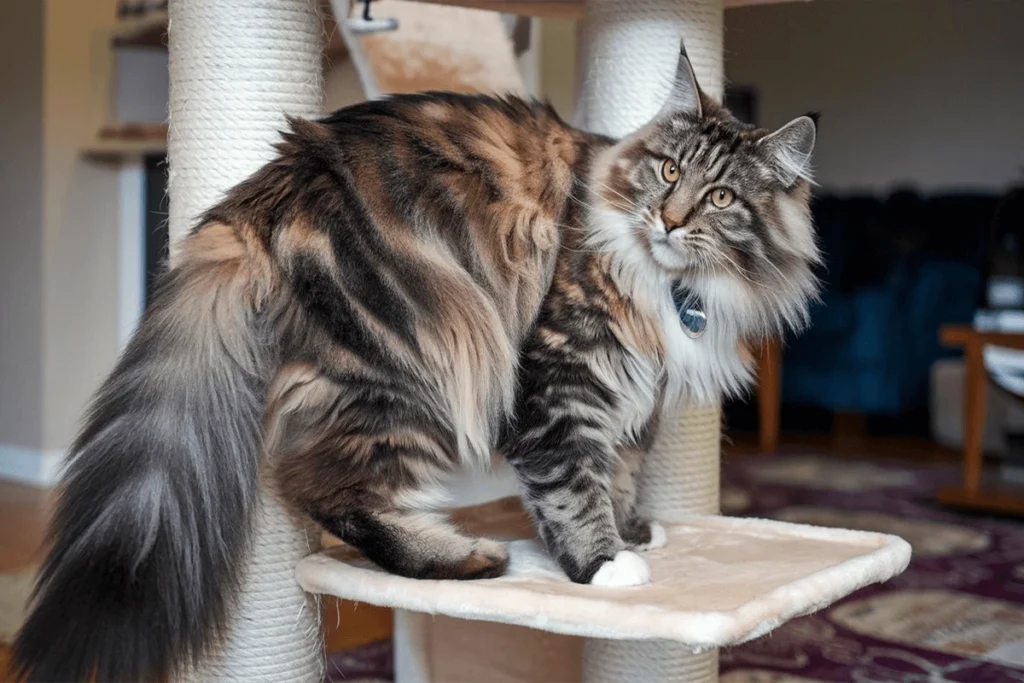
Their size isn’t just about weight. Maine Coons are long and muscular cats, with males reaching up to 40 inches from nose to tail. Their large, bushy tails often measure as long as their bodies, adding to their overall grandeur. They also have strong, sturdy legs and big, tufted paws, which help them navigate snowy terrain.
Maine Coons grow slowly compared to other breeds. While most cats reach full size within a year, Maine Coons take three to five years to mature fully. This extended growth period contributes to their large, muscular build and makes them even more distinctive.
Distinctive Coat and Grooming Needs
The Maine Coon’s coat is one of its most striking features. It is long, thick, and water-resistant, perfectly suited to the cold winters of their native New England. Their fur is uneven, with a shaggy appearance that gives them a rugged yet majestic look. They have a mane-like ruff around their neck, which is thicker in winter, and feathered fur on their legs and belly to keep them warm in harsh climates.
Maine Coons have long fur, but they are easier to care for than many other long-haired cats. Their coat is less prone to matting due to its smooth texture, but regular grooming is still essential. Brushing their coat two to three times a week helps prevent tangles and removes loose fur.
Maine Coons also benefit from seasonal grooming. During the spring and fall, when they shed their winter or summer coats, brushing should be more frequent to manage the extra shedding. Regular grooming also strengthens the bond between the owner and the cat, making it a great opportunity for quality time.
Polydactyl Paws
One of the unique and fascinating traits of some Maine Coons is polydactylism, a genetic condition that causes cats to have extra toes. While most cats have five toes on their front paws and four on their back paws, polydactyl Maine Coons can have six or more toes on each paw.
This trait was once common in Maine Coons, particularly those living in coastal areas. Sailors valued polydactyl cats because their extra toes were believed to give them better balance on slippery ship decks. These cats were also considered good luck charms during long voyages.
Although polydactylism is no longer as widespread among Maine Coons due to selective breeding, it remains a fascinating aspect of the breed’s history. Polydactyl Maine Coons are often referred to as “mitten cats” because their paws resemble tiny mittens.
The extra toes don’t affect a cat’s health or mobility. In fact, polydactyl Maine Coons are just as agile and capable as their regular-toed counterparts, and their oversized paws make them even more adept at navigating snowy or uneven surfaces. This charming and unique trait only adds to the allure of this extraordinary breed.
Personality and Temperament of The Maine Coon Cat
Gentle Giant Personality
Maine Coons are affectionately called “gentle giants,” and for good reason. Despite their impressive size, these cats have a calm and loving nature that makes them fantastic companions. They’re known for being incredibly sociable and thrive on interaction with their human families. Unlike some aloof breeds, Maine Coons are eager to form strong bonds and often follow their owners from room to room, enjoying their company.
These cats are exceptionally patient and tolerant, making them great pets for households with children or other animals. Their gentle demeanor means they’re less likely to react aggressively, even in challenging situations. Instead, they’re more likely to calmly assess their surroundings and respond with curiosity or affection.
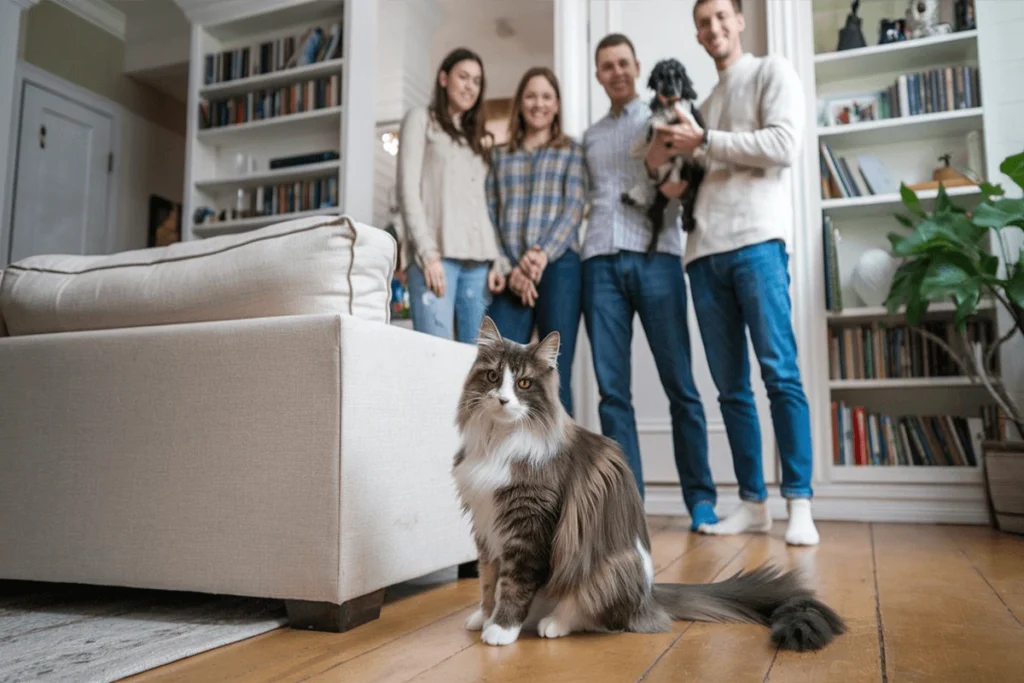
Maine Coons also tend to be vocal, but not in an annoying way. They use soft chirps, trills, and meows to communicate with their owners. Whether they’re asking for attention, food, or just chatting, their vocalizations are often endearing and make them feel like a true member of the family.
Highly Intelligent and Trainable
Maine Coons are not just physically impressive—they’re also highly intelligent. They are very smart, which helps them learn quickly and solve problems well. They enjoy mental stimulation and often figure out how to open doors, cabinets, or even turn on faucets. This intelligence also makes them curious and explorative, which can be entertaining to watch.
Training a Maine Coon is often easier than with other cat breeds. They respond well to positive reinforcement and enjoy learning new tricks, such as fetching toys or even walking on a leash. Many owners compare their trainability to that of a dog, and some Maine Coons even learn to respond to their names and come when called.
Providing puzzles, interactive toys, and other forms of mental enrichment can help keep a Maine Coon engaged and happy. Without enough stimulation, their intelligence might lead them to get into mischief. However, with the right environment, their cleverness is a joy to experience.
Playful Yet Laid-Back
Maine Coons strike a perfect balance between playfulness and relaxation. They retain their kitten-like playfulness well into adulthood, making them a delight to have around. They enjoy interactive play, whether it’s chasing a feather toy, pouncing on a laser pointer, or batting at crinkle balls. Their large size and agility make their play sessions particularly entertaining.
Despite their love for play, Maine Coons are not overly demanding or hyperactive. They have a laid-back temperament that allows them to transition easily between bursts of activity and quiet relaxation. After a play session, you’re just as likely to find them stretched out in a sunny spot or curled up next to you on the couch.
Their adaptability is another highlight of their personality. Maine Coons are equally comfortable in bustling households and quiet homes. They adjust well to new environments, making them excellent pets for families, singles, or even first-time cat owners. Their playful yet calm nature makes them one of the most well-rounded and appealing cat breeds out there.
Care and Maintenance for Maine Coon Cats
Diet and Nutrition
A Maine Coon Cat’s large size and active nature mean they have unique dietary needs. These cats require a balanced diet rich in high-quality protein to support their muscular build and energy levels. Look for cat foods with real meat, such as chicken, turkey, or fish, as the primary ingredient. Protein helps maintain their lean muscle mass and supports healthy growth, especially in kittens and young adults.
Carbohydrates should be limited, as Maine Coons are prone to weight gain if overfed or given low-quality, filler-heavy food. Healthy fats, like omega-3 and omega-6 fatty acids, are essential for their thick, luxurious coats and overall skin health.
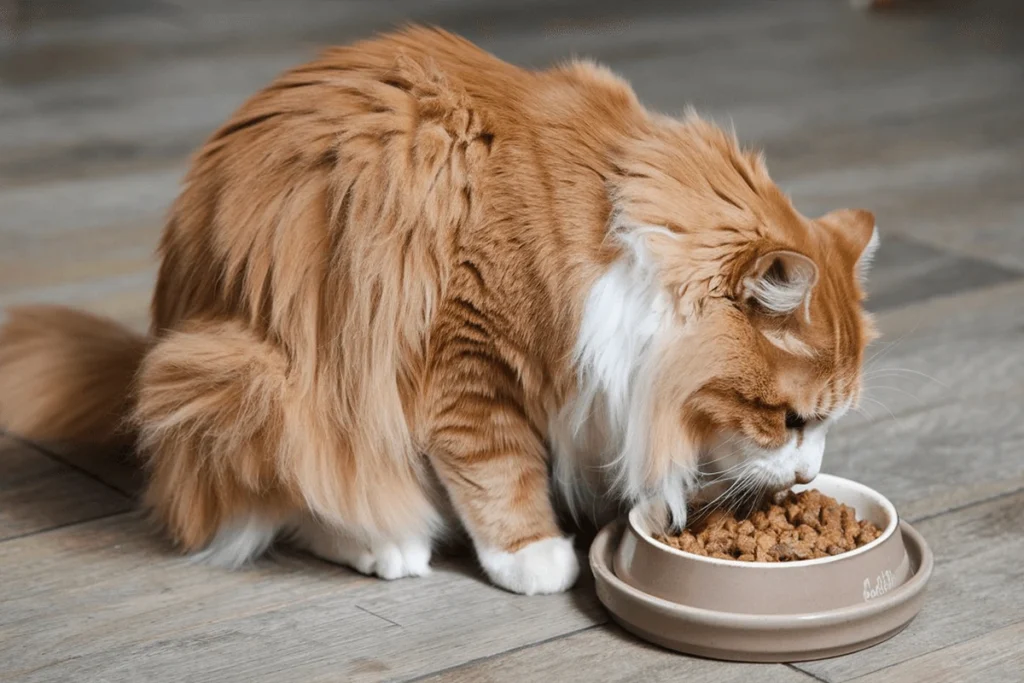
Portion control is crucial for Maine Coons. Due to their slow growth, they continue to mature until they’re about 3–5 years old. Feeding them the appropriate amount based on their age, weight, and activity level ensures they stay healthy without becoming overweight. Many Maine Coon owners prefer to feed them a mix of dry kibble and wet food to provide variety and hydration.
Fresh, clean water should always be available, as Maine Coons can be prone to urinary issues. Some owners find that these cats enjoy drinking from fountains or running water, so investing in a pet water fountain can encourage them to stay hydrated.
Furthermore, the Maine Coon’s cultural significance cannot be overstated. From their appearances in films and literature to their dominance in social media spaces, they continue to captivate audiences far and wide. They are more than just pets; they are icons of the feline world, celebrated for their grace, charm, and unwavering companionship.
Grooming Tips For Maine Coon Cat
The Maine Coon’s thick, shaggy coat is both beautiful and functional, but it requires regular maintenance to keep it healthy. Their semi-long fur is water-resistant and less prone to matting than other long-haired breeds, but tangles can still occur without proper care.
Brush your Maine Coon two to three times a week using a slicker brush or metal comb. This helps remove loose fur, prevent matting, and distribute natural oils throughout their coat. During shedding seasons in spring and fall, increase grooming sessions to manage the extra fur and reduce the chance of hairballs.
Pay special attention to areas where matting is more likely, such as behind the ears, under the legs, and around the belly. Regular grooming sessions also allow you to check for skin issues, parasites, or any unusual lumps.
In addition to coat care, don’t forget their other grooming needs. Trim their claws every few weeks to prevent overgrowth and scratching, and clean their ears gently with a pet-safe solution to remove dirt and debris. If your Maine Coon enjoys playing outdoors, inspect their paws for any injuries or stuck debris.
Finally, dental hygiene is essential. Brush their teeth regularly with a cat-specific toothbrush and toothpaste to prevent plaque buildup and gum disease. Good grooming habits not only keep your Maine Coon healthy but also strengthen your bond with them.
Health and Lifespan of the Maine Coon Cat
Maine Coons are generally healthy cats with a lifespan of 12 to 15 years, but like all breeds, they can be prone to certain genetic and health conditions. Knowing these potential issues can help you keep your cat in optimal health.
One common condition in Maine Coons is hypertrophic cardiomyopathy (HCM), a genetic heart disease that causes thickening of the heart muscle. Regular veterinary checkups and early screening can help detect and manage this condition.
Another health concern is hip dysplasia, a joint condition that can affect their mobility. This is more common in large breeds like the Maine Coon. Providing a healthy diet, maintaining a proper weight, and offering joint supplements (if recommended by a vet) can help prevent or manage this issue.
Maine Coons are also susceptible to spinal muscular atrophy (SMA), a genetic condition that affects muscle function. While it doesn’t cause pain, it can lead to weakness and mobility challenges. Responsible breeders screen for SMA to reduce the likelihood of passing it on.
Routine veterinary care is essential for keeping your Maine Coon healthy. Regular checkups, vaccinations, and parasite prevention go a long way in ensuring a long, happy life. Keeping an eye on their weight and providing a balanced diet also reduces the risk of obesity-related health issues.
With proper care, Maine Coons live fulfilling lives and remain loyal, affectionate companions well into their senior years. Providing them with a loving environment and meeting their unique needs ensures they thrive as the majestic, gentle giants they are.
Fun and Lesser-Known Facts About Maine Coons
Hunting Skills
Maine Coon Cats are renowned for their exceptional hunting abilities, a skill honed over generations. Originally prized as farm cats, they were adept at controlling rodent populations, protecting grain stores, and keeping homes free from pests. Their sharp instincts, keen eyesight, and powerful agility make them formidable hunters even today. Many Maine Coons love interactive play that mimics hunting behaviors, such as chasing feather toys or stalking laser pointers. This combination of utility and entertainment underscores their natural aptitude, making them beloved companions in both rural and urban settings.
Family-Friendly Nature
Maine Coons are often called the “gentle giants” of the cat world due to their friendly and tolerant nature. They are particularly well-suited for families with children, as they are patient and can handle the playful energy of kids without becoming aggressive or irritable. These cats are also highly social and enjoy being part of a bustling household, forming bonds with every member, including other pets. Their adaptability means they can thrive in multi-pet homes, often befriending dogs and smaller animals. This family-oriented disposition ensures that they bring warmth and companionship to any household they join.
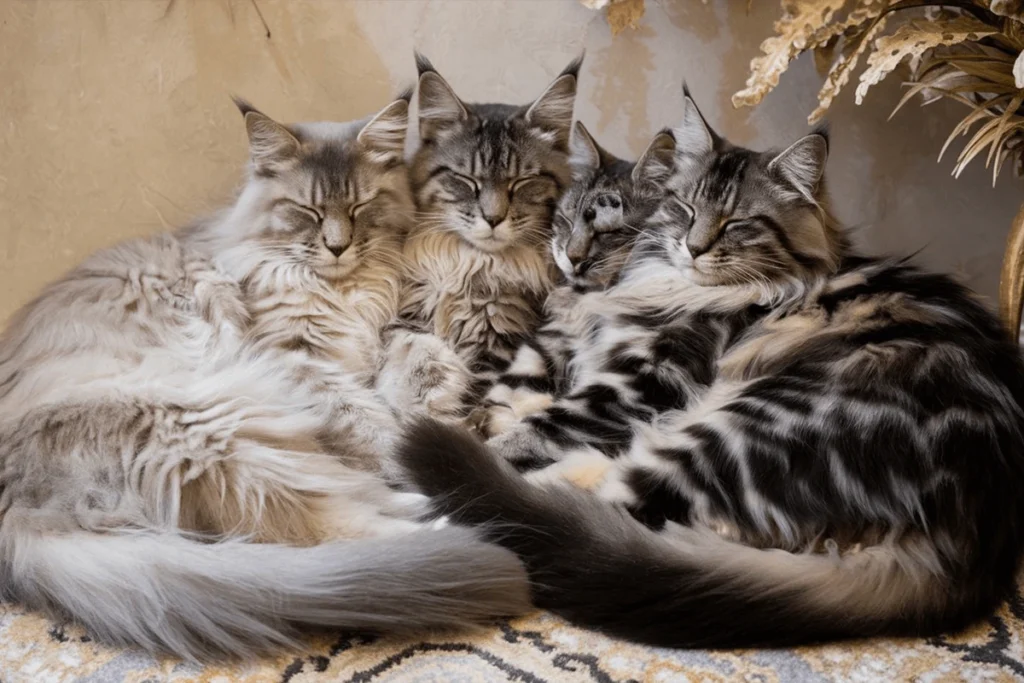
Maine Coon Cat in Pop Culture
The Maine Coon’s iconic appearance and engaging personality have made them a staple in popular culture. Their long, flowing fur, tufted ears, and bushy tails create a regal and photogenic look that has been featured in movies, television shows, and social media. For example, the Maine Coon was famously depicted in the Harry Potter series as Mrs. Norris, the loyal cat of Argus Filch. Beyond film, their presence in online communities has skyrocketed, with numerous Maine Coons becoming social media stars. Fans worldwide follow these cats for their majestic poses, playful antics, and heartwarming interactions, cementing the Maine Coon’s status as a cultural and internet favorite.
You can Learn a lot more about Breeds on PawPits Official website
Conclusion
The Maine Coon Cat is a truly remarkable breed that has captured the hearts of cat lovers around the world. From their mysterious and fascinating origins steeped in folklore to their unique physical traits like polydactyl paws and luxurious water-resistant coats, Maine Coons are a breed unlike any other. Their exceptional personality, which balances intelligence, playfulness, and a gentle demeanor, makes them ideal companions for families, singles, and pet enthusiasts alike.
Caring for a Maine Coon Cat requires dedication, as their size, coat, and dietary needs demand consistent attention. However, the effort is undoubtedly worth it. Their loyalty and affection create deep bonds with their owners, and their sociable nature ensures they fit seamlessly into a variety of households, including those with children and other pets. Their adaptability and natural hunting instincts are a testament to their rich history as both working cats and beloved companions.
Whether you’re considering adding a Maine Coon to your family or are already a proud owner, these majestic cats have a way of enriching lives with their unique blend of beauty and personality. We hope this article has deepened your appreciation for this extraordinary breed. If you have any stories or experiences with Maine Coons, we invite you to share them in the comments below. Let’s celebrate these gentle giants together!
to Discover Even more about Cats and breeds, you can check This!
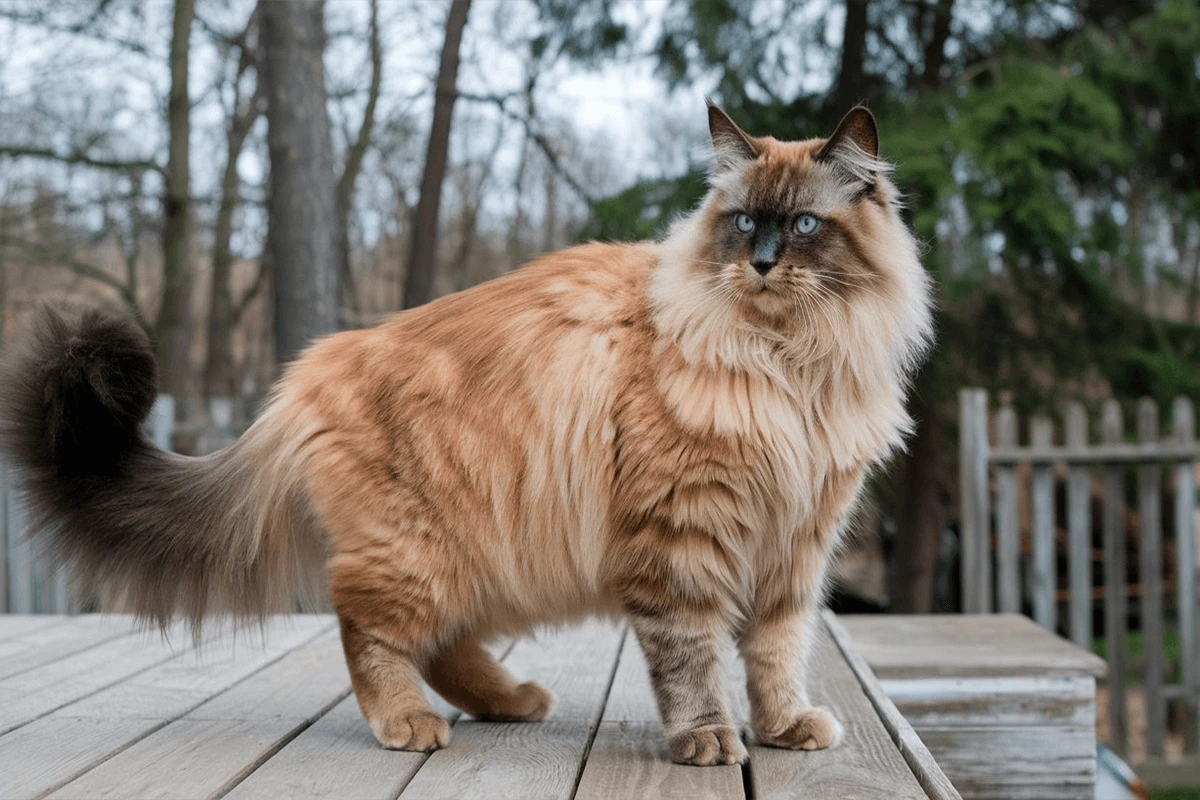
2 thoughts on “10 Fascinating Facts About Maine coon cat You Need to Know”
Comments are closed.